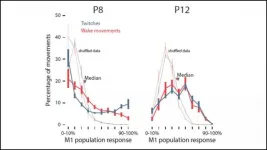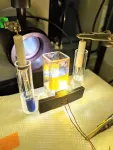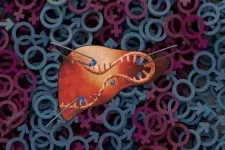(Press-News.org) Three decades ago, child development researchers found that low-income children heard tens of millions fewer words in their homes than their more affluent peers by the time they reached kindergarten. This "word gap" was and continues to be linked to a socioeconomic disparity in academic achievement.
While parenting deficiencies have long been blamed for the word gap, new research from the University of California, Berkeley, implicates the economic context in which parenting takes place -- in other words, the wealth gap.
The findings, published this month in the journal Developmental Science, provide the first evidence that parents may talk less to their kids when experiencing financial scarcity.
"We were interested in what happens when parents think about or experience financial scarcity and found evidence that such strain could suppress their speech to their children," said study senior author Mahesh Srinivasan, a professor of psychology at UC Berkeley.
"Our results suggest that parenting training may not be sufficient to close the academic achievement gap without addressing the broader issue of income inequality," Srinivasan added.
The study's preliminary results lend credence to the developmental and educational benefits of such poverty-cutting government programs as the federal American Rescue Plan's Child Tax Credit and other supplemental cash payouts for needy families.
"Existing interventions toward eliminating the word gap have often focused on improving parenting skills," Srinivasan said. "But our findings suggest that relieving parents of their financial burdens, such as through direct cash transfers, could also substantially change the ways they engage with their kids."
In the first experiment, researchers sought to observe how parents would interact with their children (in this case, 3-year-olds) after the parents were asked to describe times in which they had recently experienced scarcity. A control group of parents were instead asked to describe other recent activities.
Of the 84 parents in the study, those in the experimental group who described their experiences of financial scarcity spoke less to their 3-year-olds during laboratory observations than parents who reflected on other forms of scarcity (like not having enough fruit), or parents who had not been asked to recollect experiences of resource insecurity.
The second experiment used existing data collected via LENA technology, tiny "talk pedometer" devices worn by children that record their conversations and count the words they hear and say.
As the researchers predicted, analyses revealed that parents engaged in fewer conversational turns with their children at the month's end, a time that typically coincides with money being tight as parents await paychecks or other sources of income.
"Because we had recordings from the same parents at different times of the month, we could essentially use parents as their own controls," said study lead author Monica Ellwood-Lowe, a Ph.D. student in psychology at UC Berkeley.
"This allowed us to really pinpoint differences in their speech patterns when they were more or less likely to be experiencing financial strain, independent of any of their own personal characteristics."
The term "word gap" was coined in the early 1990s when University of Kansas researchers Betty Hart and Todd Risley tracked verbal interactions in the homes of 42 families to study early language development in the children's first three years.
Each day, the researchers recorded an hour of conversation in each household, then counted all the words the children heard during those recording times.
The results were detailed in their 1995 book, Meaningful Differences in the Everyday Experience of Young American Children, and in a 2003 follow-up article, "The Early Catastrophe: The 30 Million Word Gap by Age 3."
While some have questioned Hart and Risley's methodology, their basic finding has been replicated many times, prompting calls for approaches to narrow the disparity. Enter Srinivasan and his research team:
"It struck us that what was missing from the conversation about the word gap was the possibility that poverty, and the many difficult experiences associated with it, could itself affect parents' speech," Srinivasan said.
Preliminary findings support the researchers' hypothesis but also call for a deeper dive into the relationship between money worries and parents' verbal engagement with their children, he said.
"This research doesn't mean that children whose parents are struggling financially are doomed to have smaller vocabularies," Ellwood-Lowe said. "The takeaway here is really just the importance of making sure parents have the resources they need to parent."
"If you are worried about putting food on the table tonight, or scraping together money for that medical bill, or figuring out where to enroll your child in school now that you have been evicted from your neighborhood, you may be less likely to narrate the color of the sky to your child as you ride together on the bus," the study concludes.
INFORMATION:
Electrical activity in the motor cortex of rats transforms from redundant to complex over the span of four days shortly after birth. Sleep twitches guide this metamorphosis, according to new research published in JNeurosci.
Despite its name, the motor cortex doesn't control movement right off the bat. Early in development, this part of the brain is solely a sensory structure. Feedback from self-generated movements -- sleep twitches in particular -- may build representations of the body that will later orchestrate movement.
To characterize this transition, Glanz et al. recorded electrical activity from the motor cortex of rat pups eight and 12 days after birth while monitoring their behavior. ...
Politicians may have good reason to turn to angry rhetoric, according to research led by political scientists from Colorado--the strategy seems to work, at least in the short term.
In a new study, Carey Stapleton at the University of Colorado Boulder and Ryan Dawkins at the U.S. Air Force Academy discovered that political furor may spread easily: Ordinary citizens can start to mirror the angry emotions of the politicians they read about in the news. Such "emotional contagion" might even drive some voters who would otherwise tune out of politics to head to the polls.
"Politicians want to get reelected, and anger is a powerful tool that they can use to make that happen," said Stapleton, who recently earned his PhD in political science at ...
ROCHESTER, Minn. -- Did you know multiple sclerosis (MS) means multiple scars? New research shows that the brain and spinal cord scars in people with MS may offer clues to why they developprogressive disability but those with related diseases where the immune system attacks the central nervous system do not.
In a study published in Neurology, Mayo Clinic researchers and colleagues assessed if inflammation leads to permanent scarring in these three diseases:
MS.
Aquaporin-4 antibody positive neuromyelitis optica spectrum disorder (AQP4-NMOSD).
Myelin oligodendrocyte glycoprotein antibody associated disorder (MOGAD).
They also studied whether scarring may be a reason for ...
For decades, researchers around the world have searched for ways to use solar power to generate the key reaction for producing hydrogen as a clean energy source -- splitting water molecules to form hydrogen and oxygen. However, such efforts have mostly failed because doing it well was too costly, and trying to do it at a low cost led to poor performance.
Now, researchers from The University of Texas at Austin have found a low-cost way to solve one half of the equation, using sunlight to efficiently split off oxygen molecules from water. The finding, published recently in Nature Communications, represents a step forward toward greater adoption ...
GAINESVILLE, Fla. --- Plants are DNA hoarders. Adhering to the maxim of never throwing anything out that might be useful later, they often duplicate their entire genome and hang on to the added genetic baggage. All those extra genes are then free to mutate and produce new physical traits, hastening the tempo of evolution.
A new study shows that such duplication events have been vitally important throughout the evolutionary history of gymnosperms, a diverse group of seed plants that includes pines, cypresses, sequoias, ginkgos and cycads. Published today in Nature Plants, the research indicates that ...
FINDINGS
A chemical modification that occurs in some RNA molecules as they carry genetic instructions from DNA to cells' protein-making machinery may offer protection against non-alcoholic fatty liver, a condition that results from a build-up of fat in the liver and can lead to advanced liver disease, according to a new study by UCLA researchers.
The study, conducted in mice, also suggests that this modification -- known as m6A, in which a methyl group attaches to an RNA chain -- may occur at a different rate in females than it does in males, potentially explaining why females tend to have higher fat content in the liver. The researchers found that without the m6A modification, differences in liver fat content between the sexes were reduced dramatically.
In ...
WOODS HOLE, Mass. - What's a hungry marine microbe to do when the pickings are slim? It must capture nutrients - nitrogen, phosphorus, or iron - to survive, yet in vast expanses of the ocean, nutrients are extremely scarce. And the stakes are high: Marine microbial communities drive many of the elemental cycles that sustain all life on Earth.
One ingenious solution to this challenge is reported this week in Proceedings of the National Academy of Sciences. In low-nutrient environments, marine microbes can clump together and hook up with even tinier cells that have vibrating, hairlike appendages (cilia) on their surface. ...
New York, NY--July 19, 2021-- A new robotic neck brace from researchers at Columbia Engineering and their colleagues at Columbia's Department of Otolaryngology may help doctors analyze the impact of cancer treatments on the neck mobility of patients and guide their recovery.
Head and neck cancer was the seventh most common cancer worldwide in 2018, with 890,000 new cases and 450,000 deaths, accounting for 3% of all cancers and more than 1.5% of all cancer deaths in the United States. Such cancer can spread to lymph nodes in the neck, as well as other organs in the body. Surgically removing lymph nodes in the neck can help doctors investigate the risk of spread, but may result in pain and stiffness in the shoulders and neck for years afterward.
Identifying ...
CT scans for patients with concussion provide critical information about their risk for long-term impairment and potential to make a complete recovery - findings that underscore the need for physician follow-up.
In a study led by UC San Francisco, researchers looked at the CT scans of 1,935 patients, ages 17 and over, whose neurological exams met criteria for concussion, or mild traumatic brain injury (TBI), at hospitals throughout the nation. While links between CT imaging features and outcome have already been established in moderate and severe TBI, the researchers believe this is the first time the link has been identified in patients ...
Hamilton, ON (July 19, 2021) - A potentially game-changing treatment for people with, or at risk of, blood clots has been found effective by an international team of researchers led by McMaster University's Jeffrey Weitz.
Weitz's team compared abelacimab with enoxaparin as a control drug in 412 patients undergoing knee replacement surgery. Results showed that just one abelacimab injection prevents blood clots for up to a month after surgery, reducing the risk by about 80% compared with enoxaparin without increasing the risk of bleeding.
Their findings were published in the New England Journal of Medicine today, coinciding with Weitz's presentation of the research at the International Society on Thrombosis and Hemostasis 2021 Congress.
Weitz, a hematologist, is a professor of medicine ...




